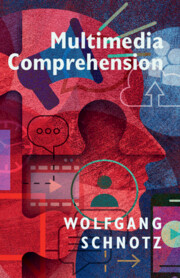Book contents
- Multimedia Comprehension
- Multimedia Comprehension
- Copyright page
- Dedication
- Contents
- Preface
- Chapter 1 Introduction
- Chapter 2 A Short History of Multimedia Sign Systems
- Chapter 3 Basic Forms of Representations
- Chapter 4 Comprehension of Text
- Chapter 5 Comprehension of Pictures
- Chapter 6 Integrative Comprehension of Texts and Pictures
- Chapter 7 Quasi-symbiotic Relations between Text and Picture Comprehension
- Chapter 8 Beyond Comprehension
- Chapter 9 Practical Implications
- Concluding Remarks
- References
- Index
Concluding Remarks
Published online by Cambridge University Press: 16 February 2023
- Multimedia Comprehension
- Multimedia Comprehension
- Copyright page
- Dedication
- Contents
- Preface
- Chapter 1 Introduction
- Chapter 2 A Short History of Multimedia Sign Systems
- Chapter 3 Basic Forms of Representations
- Chapter 4 Comprehension of Text
- Chapter 5 Comprehension of Pictures
- Chapter 6 Integrative Comprehension of Texts and Pictures
- Chapter 7 Quasi-symbiotic Relations between Text and Picture Comprehension
- Chapter 8 Beyond Comprehension
- Chapter 9 Practical Implications
- Concluding Remarks
- References
- Index
Summary
In future, an increasing number of people will need to learn continuously in order to orient themselves in the quickly changing world around them. Multimedia communication and multimedia comprehension will be key elements of their learning. Accordingly, it is very important to have a sufficiently deep understanding of the psychological processes behind multimedia comprehension. This understanding should be rooted in theory-driven empirical research about the cognitive processing of multiple representations, particularly of texts and pictures. It should also allow practice-oriented basic recommendations to be derived for the design and usage of multimedia. These recommendations should go beyond everyday knowledge, practical experience, intuition, and the use of seemingly professional surface features. Design of multimedia communication has to be based on sufficiently deep knowledge about the psychological processes involved in comprehension and knowledge construction. Practitioners need to receive scientific support for them to better understand the laws of perception and cognitive processing underlying comprehension and knowledge acquisition.
- Type
- Chapter
- Information
- Multimedia Comprehension , pp. 217Publisher: Cambridge University PressPrint publication year: 2023

